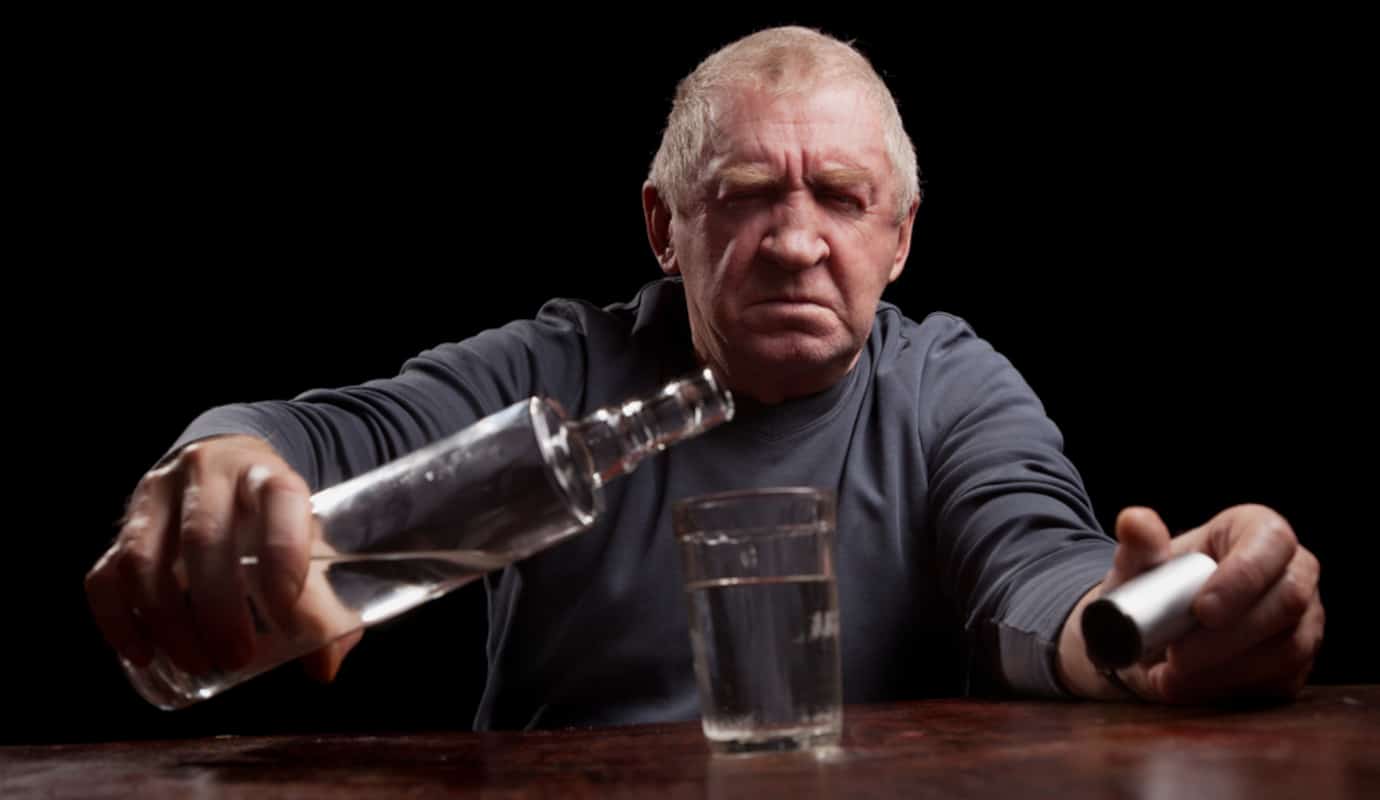When dementia and alcohol abuse intersect, caregivers face a particularly challenging situation – one that demands compassion, strategy, and specialized knowledge. The cognitive impairments of dementia can make recognizing problematic drinking behaviors more difficult, while alcohol can accelerate cognitive decline and increase safety risks.
These six evidence-based tips help caregivers navigate this complex issue with practical interventions, from creating a safer environment to finding alternative coping mechanisms for their loved ones. With the right approach, you can reduce harm while preserving dignity during this sensitive journey.

Dementia and Alcohol Abuse Don’t Mix Well
When someone with a history of alcohol abuse develops Alzheimer’s disease or dementia, it can become a very challenging situation for families to manage.
Alcoholism plus dementia causes a faster decline in skills needed to function independently, worsens behavioral problems, and raises safety concerns for the person with dementia and their caregivers.
*Add In Medications, and it Can Be Even More Dangerous
Someone who is drinking is at higher risk for serious drug interactions that could cause falls, increased confusion, internal bleeding, heart problems, and more.
What makes managing alcoholism especially tough is that the person with dementia often won’t remember how much they drank. They will resist attempts to reduce their drinking and neglect their nutrition, water intake, and hygiene.
Realistically, the overuse of alcohol has most likely been going on for a long time and will probably be a challenging behavior to change completely or quickly.
To reduce challenging symptoms and behaviors as well as make sure the situation is safe, we've got 6 tips for coping with dementia and alcohol abuse.
6 Tips for Managing Dementia and Alcohol Abuse
1. Remove all alcohol from the environment
- Clear out all the alcohol in the home, including cough syrup and other “innocent” sources.
- Make sure all family and friends know not to buy or bring any alcohol
- Notify liquor or grocery stores not to deliver alcohol
- If necessary, restrict access to money that can be used to purchase alcohol
Important: Before removing alcohol, check with your older adult’s doctor to make sure you won’t be causing any harm to their health. In some cases, people may experience severe withdrawal or other unintended side effects.
2. Substitute non-alcoholic wine or beer
Some people may be at a point in the dementia where they wouldn’t notice if their regular drinks were replaced with non-alcoholic or low-alcohol versions.
For wine, you could even disguise the swap by using a regular wine bottle and replacing the contents with non-alcoholic wine.
3. Take safety measures
- Prevent impaired driving by removing car keys, disabling the car, or moving the car away
- Remove or lock away sharp objects and weapons to prevent injury
- Secure doors or add door alarms to prevent accidental wandering
- Lock away cleaning supplies and other toxic liquids – they could be confused with drinks
4. Protect yourself
Alcoholism and dementia are two severe conditions that cause angry outbursts or violent behavior in some people. Together, they can cause even worse behavior.
That’s why it’s essential to know your limits and ensure the situation is safe. If your older adult becomes overly aggressive or violent, it’s time to remove yourself and seek professional help.
Caring for someone with both alcoholism and dementia is very challenging. Getting additional support will also help you cope.
That could include caregiver support groups (in person or online), therapy or counseling, or support groups for people who are close to an alcoholic.
5. Find out what’s causing the alcohol abuse
Your older adult is unlikely to tell you why they drink, but you may be able to pick up clues by observing what they say and do.
It could be that they’re depressed, anxious, lonely, or grieving.
If you suspect an emotional issue, speak with a geriatric psychiatrist or experienced therapist to figure out how to get your older adult the help and support they need to reduce the need to drink.
6. Get help from professionals
- Ask doctors for advice.
- Contact Alzheimer’s or dementia organizations to find out about local resources for alcoholics with dementia – the Alzheimer’s Association is a great place to start.
- Call addiction organizations to see if there are any programs available for people with dementia.
Traditional Rehab May Not Be a Realistic Option
When someone has dementia, voluntarily participating in a traditional rehab program for alcohol addiction is not likely to happen.
When the brain is already damaged by dementia, making good decisions and building new habits and ways of thinking becomes very difficult or impossible.
In some cases, people with dementia may be hospitalized to detox from alcohol and later, moved to a secured memory care community where there is no access (or controlled access) to alcohol.
Recommended for you:
- How to Deal with Aggressive Dementia Behavior: 14 Tips
- 3 Stages of Dementia: What to Expect as the Disease Progresses
- 7 Ways to Reduce and Manage Mean Dementia Behavior
About the Author

Connie Chow
Connie was a hands-on caregiver for her grandmother for 20 years. (Grandma made it to 101 years old!) She knows how challenging, overwhelming, and all-consuming caring for an older adult can be. She also knows how important support is — especially in the form of practical solutions, valuable resources, and self-care tips.





There are now non-alcoholic versions of most popular beers eg Budweiser, Heineken available. They look and taste much like their alcoholic cousins, making it easier to pass them off as the real thing.
That’s a great point! Thanks for the helpful suggestion.
Thanks so much for this tip! He used to drink Busch beer so was easy to pass the NA off. He likes it & is much happier with life in general. I’m grateful & thankful. Alcohol has never done anyone any favors!
So glad this worked well!
My Dad has lived in our annex for 13 yrs.. the last 4 with Alzheimer’s. Since covid-19 his clubs have finished, my family are now working from home and homeschooling and he started drinking and he is aggressive and really nasty to everybody. I am his power of attorney and I’m trying to get him help but the mental health teams are more interested in how he feels then how the family caring for him is coping …I too I’m at my wits end.
It’s wonderful that you’re able to have your dad live with you. We’re so sorry to hear about your dad’s recent drinking and mean behavior caused by Covid-19 isolation. It’s great that you’ve gotten help for him, hopefully that helps steer him toward healthier coping strategies.
This behavior certainly adds to your and your family’s stress. Since your dad’s mental health teams aren’t able to help you too, you may want to look into separate counseling or therapy services. We share 3 helpful resources here — 3 Sources of Affordable Counseling Services to Reduce Caregiver Stress https://dailycaring.com/low-cost-therapy-options-help-caregivers-cope/
How do you go about getting him admitted to a care facility…..I am frantic and at my wits end.
I’m so sorry this is happening. If you choose to move someone to a care community, the person with Power of Attorney would have the ability to make those legal and financial decisions. From there, it’s a matter of selecting the care community and being able to pay for it.
My Dad is hospitalized due to diabetes foot amputation. My mom is an alcoholic with dementia at age80 I need help because my Dad who is the caregiver is no longer here, what do we do in a situation like this?
We’re so sorry to hear about your dad’s hospitalization. That certainly makes a challenging situation even tougher.
It sounds like you’ll need some caregiving help to care for your mom while your dad recovers from his surgery. There are a few options to consider and what works best for your family will be specific to your situation.
You could:
– Put together a caregiving team of family, close friends, or volunteers
– Hire a caregiver through a home care agency
– Hire a caregiver privately
– A mix of the above home care options
– Moving to a memory care community (assisted living for dementia)
Here are some articles with helpful information:
– 7 Steps for Hiring a Caregiver for In-Home Help https://dailycaring.com/7-steps-for-hiring-a-caregiver-for-in-home-help/
– 4 Questions to Ask When Choosing a Home Care Agency https://dailycaring.com/4-questions-to-ask-when-choosing-a-home-care-agency/
– Affordable In Home Care: 8 Ways to Lower Senior Care Costs https://dailycaring.com/affordable-in-home-care-8-ways-to-lower-senior-care-costs/
– 3 Tips to Help You Choose Between Assisted Living vs In Home Care https://dailycaring.com/3-tips-to-help-you-choose-between-assisted-living-vs-in-home-care/
What about everybody else? What about our safety? How do I protect myself my children and my pets. He’s always been a piece of s*** but now he’s a demented piece of s***. I wish he would die. My mother is dying trying to take care of him. He’s made everyone in my life miserable. He crippled my child. All he cares about is a drink and another drink. It’s always been the only thing he cared about.
I’m so sorry this is happening, it’s clearly a difficult situation. If your and your family’s safety is at risk, it’s time to consider moving him to a memory care or assisted living community where he can be cared for by a professional staff.
I know exactly what you mean. I too have lived with this piece of s*** for 10 years and he’s brought nothing but destruction to my family. Worse now, he doesn’t even f***ing remember and is constantly, I mean constantly not only in denial but rude and angry towards anyone that suggests otherwise. Demented alcoholics are one very good reason to allow euthanasia.
I’m going through pretty much the same thing. My husband has been a drinker for as long as I can remember. He’s got worse over the years. He’s 74 now and is drinking everyday. He can’t remember the simplest things. He isn’t handling his responsibilities at all. He leaves the house everyday. He says he’s going to the hardware store etc only to go to his favorite bar(s). He’s gone all day with no check ins at home. I never know when he’s coming home. When he does come home he goes straight to bed. He sleeps for hours. When he gets up in the morning, it starts all over. Same thing day after day. Drinks coffee, eats breakfast, showers, gets dressed and leaves. Never says he’s going to the bar, always says he’s going somewhere else. Places that should only take an hour or less. After a certain amount of time, I know where he is, at a bar. It truly does suck!!
I’ve found diluting the alcohol with water has worked wonders. So far in the 2 months I’ve been doing this, there is much less confusion and alcohol related chaos. My husband has not noticed the difference and still enjoys what he drinks. I think the drinking is more out of habit and ritual than experiencing the effects of the alcohol at this point. Earlier this probably would not have worked with him.
Fantastic suggestion!! A great thing to try, especially if someone is a bit more advanced in their dementia.
Does it work with beer?
You could give it a try to see if it would work for your situation. Maybe try plain soda water to keep it bubbly?
Can I suggest that instantly cutting off alcohol to a dependent drinker can be fatal.
Please don’t do this unilaterally without medical advice and qualified supervision.
Withdrawal symptoms can include fits, brain injury and hallucinations.
I have personal experience of this and well-meaning attempts to control alcohol access can have severe unwanted repercussions.
Kate — That’s a great point, depending on the severity of the alcohol addiction, going cold turkey may not be a good way to manage the situation. It’s always good to check with a doctor to make sure any changes will be beneficial in the specific situation.